Key takeaways
- Community engagement transforms classrooms into vibrant learning environments, fostering ownership and pride in education among students and local members.
- Philosophy education encourages critical thinking through questioning, helping students develop personal connections with the material and reflect on their values.
- Integrating community perspectives in philosophy discussions enhances student investment and relevance, making philosophical concepts applicable to real-life situations.
- Measuring the impact of community engagement goes beyond data, focusing on shifts in student confidence, inclusivity, and the quality of ongoing dialogues between schools and communities.
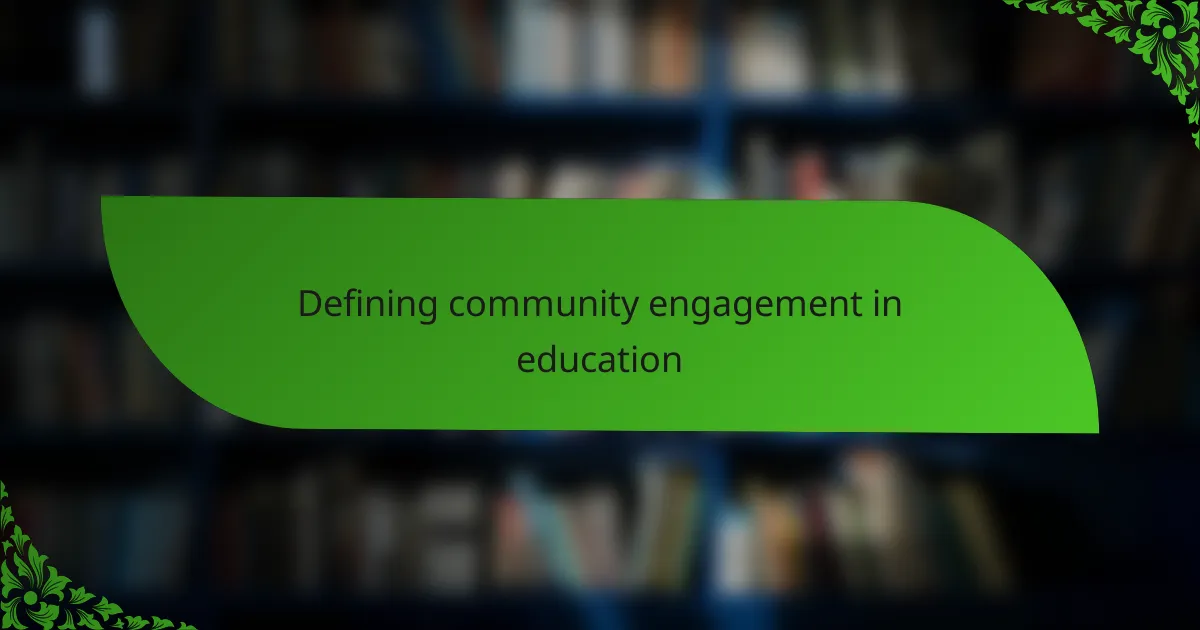
Defining community engagement in education
Community engagement in education, to me, is about more than just inviting locals into the classroom. It’s a dynamic partnership where students, educators, and community members come together, sharing knowledge and experiences that enrich learning beyond textbooks. Have you ever noticed how a lively discussion with someone from outside the school breathes new life into a lesson?
When I first involved parents and neighborhood leaders in philosophy discussions at school, I saw immediate shifts—not only in student interest but in the community’s sense of pride and ownership in education. This engagement transforms the learning environment into a vibrant space that reflects real-world concerns and values. It makes education feel like a shared journey rather than a solitary task.
Thinking about community engagement prompts me to ask: What if schools weren’t islands but hubs where everyone’s voice mattered? This question challenges traditional norms and opens up possibilities for education systems deeply rooted in the collective wisdom and needs of their communities.
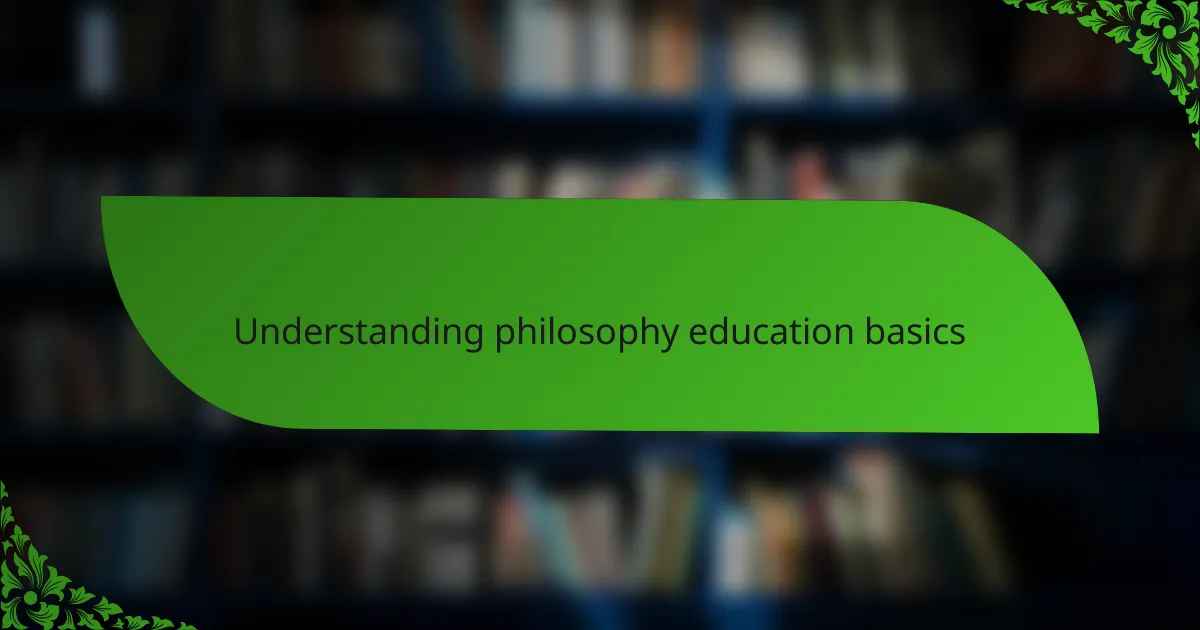
Understanding philosophy education basics
Philosophy education starts with the simple yet powerful act of questioning. I remember how, early on, encouraging students to ask “Why?” instead of just accepting facts opened up a whole new world for them. This approach isn’t about finding quick answers but about exploring ideas deeply and uncovering different perspectives.
At its core, philosophy education teaches critical thinking and reasoning. When I facilitate discussions, I see how students learn to analyze arguments and develop their own viewpoints with confidence. It’s rewarding to watch them shift from passive receivers to active thinkers, a transformation that stays with them beyond the classroom.
Have you ever noticed how philosophy classes challenge not just the mind but also the self? In my experience, engaging with philosophical questions invites students to reflect on their values and beliefs, making learning a truly personal journey. This is what makes philosophy education so uniquely impactful—it connects the intellectual with the human experience.
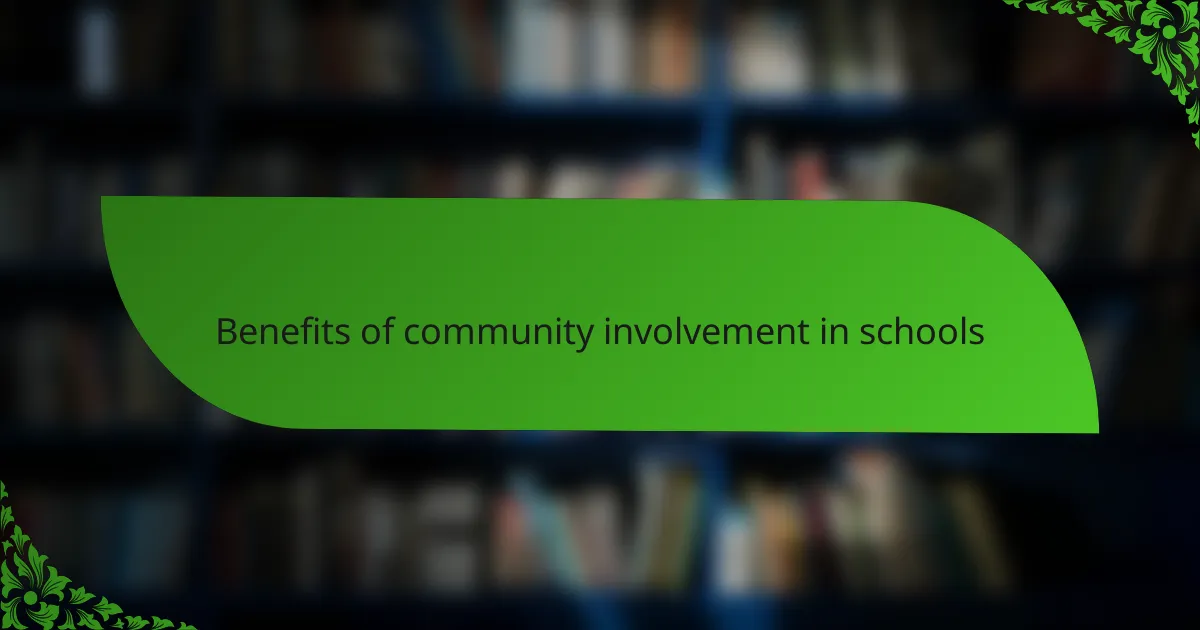
Benefits of community involvement in schools
One of the most striking benefits I’ve witnessed when communities get involved in schools is the boost in student motivation. When a local artist or elder shares their story, suddenly the lessons gain real-world relevance, sparking curiosity that textbooks alone can’t ignite. Have you ever noticed how students light up when they see their own neighborhood reflected in what they’re learning?
Community involvement also fosters a sense of belonging that profoundly impacts students’ confidence and resilience. I recall a time when a small group of parents started volunteering regularly, and the students began to see their education as a shared responsibility rather than just their own challenge. This collective support transforms the school atmosphere, making it more welcoming and encouraging.
Moreover, the exchange between schools and their communities enriches everyone involved with diverse perspectives. I often marvel at how these interactions open doors to cultural understanding and empathy, qualities essential not only in philosophy but in life. Isn’t that what education should ultimately be about—preparing thoughtful, compassionate citizens?
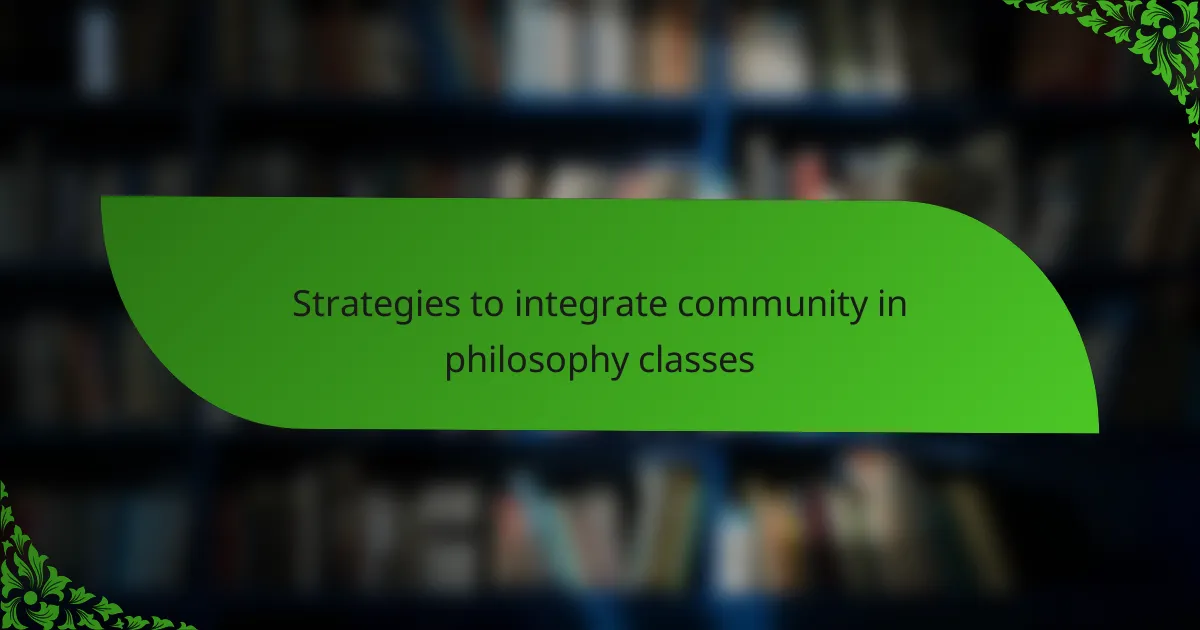
Strategies to integrate community in philosophy classes
When I first invited local community members to co-lead philosophy discussions, I noticed how students became more invested. It’s as if hearing real-world perspectives breathed life into abstract concepts, making ideas feel relevant and urgent. Have you ever watched a classroom suddenly buzz because a guest shared a story that connected with the lesson? That’s the magic of integrating community voices directly into philosophical inquiry.
Another strategy I rely on involves creating service-learning projects tied to philosophical themes. For example, students might explore justice by engaging with community organizations focused on equity. This hands-on approach not only deepens understanding but also grounds theory in lived experience, transforming philosophy from a distant discipline into a tool for social reflection and change.
Lastly, I encourage students to bring their own communities into the conversation by sharing family traditions, local histories, or neighborhood dilemmas. This personal connection fosters empathy and diversifies the discourse. When learners realize that philosophy can emerge from their own lives and surroundings, it shifts from a subject in school to a meaningful part of their identity. Isn’t that the kind of engagement we want to cultivate?
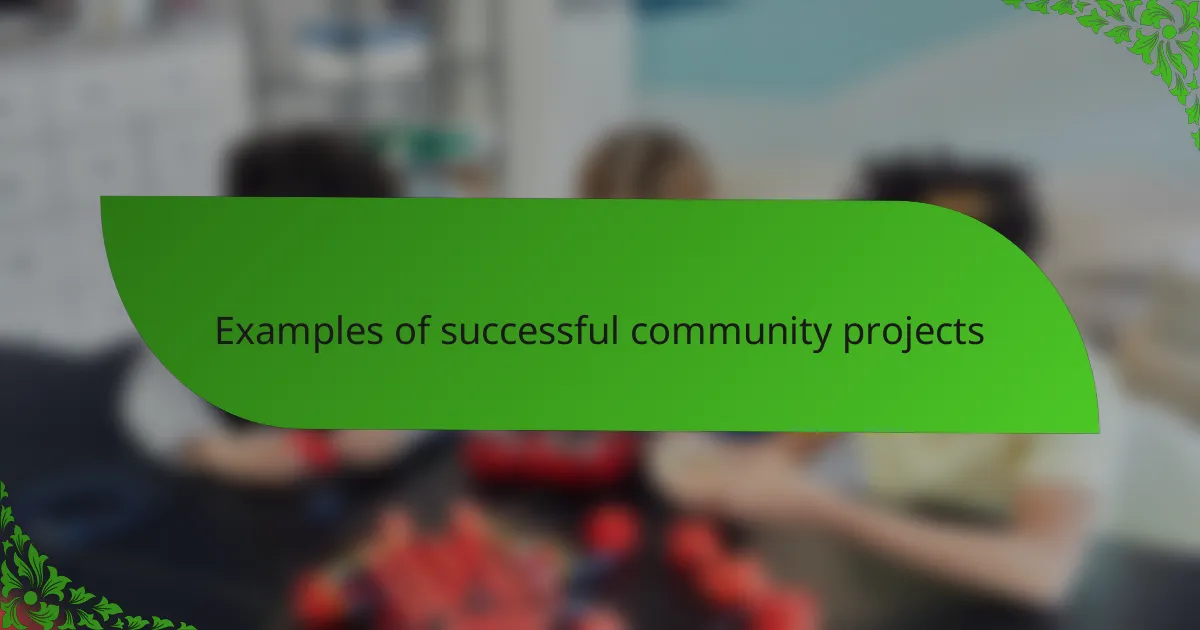
Examples of successful community projects
One community project I found deeply moving involved partnering students with elder storytellers from the neighborhood. Hearing those stories, rich with lived wisdom and philosophical reflections, transformed classroom debates into heartfelt explorations. It made me wonder—what happens when history isn’t just learned but experienced through personal narrative?
Another successful initiative was a student-led philosophy fair open to local families and residents. Watching students confidently present their ideas and listen to diverse perspectives outside the classroom filled me with pride and hope. Could sharing philosophy in this communal way be the key to breaking down barriers and building understanding?
There was also a project where students collaborated with a neighborhood justice center to debate real cases on fairness and equity. The energy in those sessions was electric, as abstract concepts suddenly gained tangible meaning. Have you ever seen young minds grapple passionately with justice not as theory, but as something they can affect in their own community? That’s when education truly comes alive.
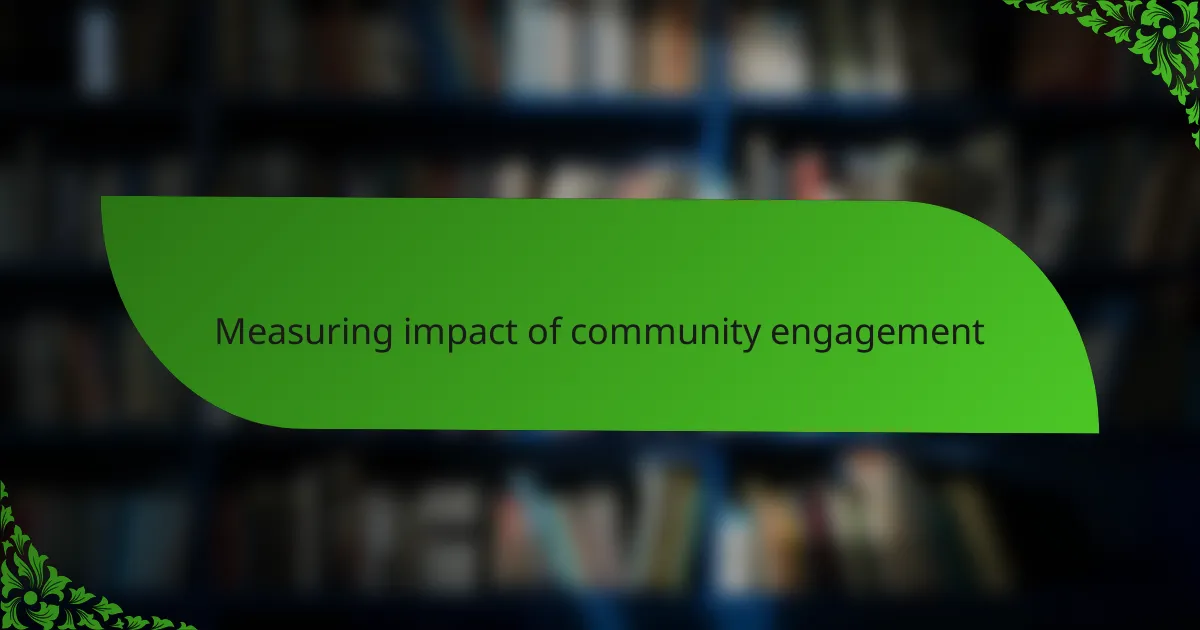
Measuring impact of community engagement
Measuring the impact of community engagement, to me, is both an art and a science. I’ve learned that quantitative data like attendance numbers or test scores only capture part of the story. What truly reveals impact are the subtle shifts—in student confidence, in the enthusiasm during discussions, or in the way parents transform from observers into active partners.
Sometimes, I ask myself, how can I know if a philosophical conversation sparked by a community guest really changes a student’s way of thinking? The answer often lies in the long-term ripple effects: a student who begins to question more deeply, or a classroom atmosphere that feels more inclusive and dynamic. These intangible outcomes remind me that measuring impact means looking beyond numbers to the human experiences education creates.
I recall a time after hosting a community philosophy panel when parents shared how their children started bringing home new questions and challenges about fairness and ethics. That moment made me realize impact is also about connection—building bridges between school and community so strong they encourage ongoing dialogue well after the bell rings. Isn’t that the kind of success worth capturing?